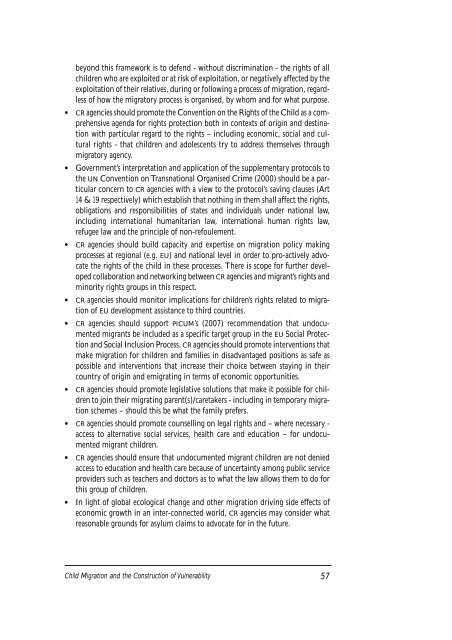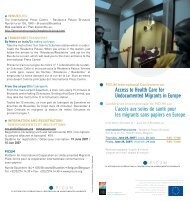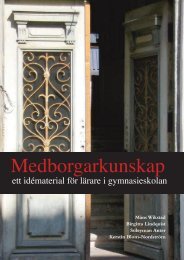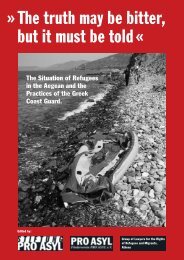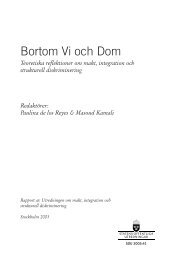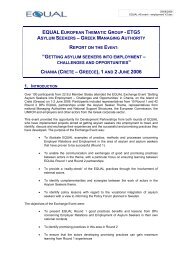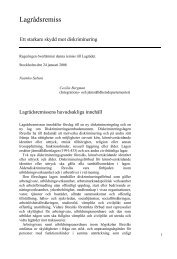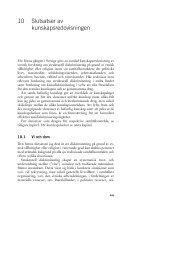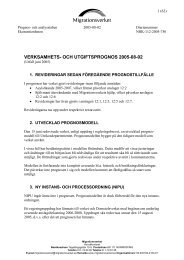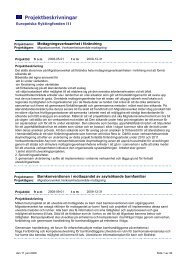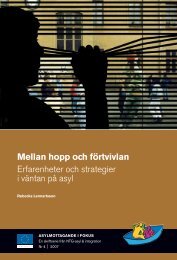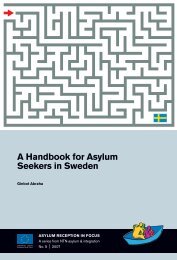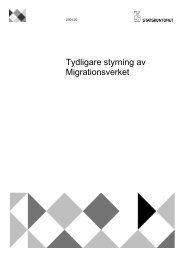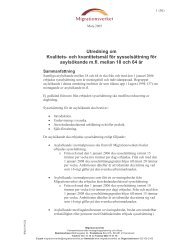and the Construction of Vulnerability - Child Trafficking
and the Construction of Vulnerability - Child Trafficking
and the Construction of Vulnerability - Child Trafficking
You also want an ePaper? Increase the reach of your titles
YUMPU automatically turns print PDFs into web optimized ePapers that Google loves.
eyond this framework is to defend - without discrimination - <strong>the</strong> rights <strong>of</strong> all<br />
children who are exploited or at risk <strong>of</strong> exploitation, or negatively affected by <strong>the</strong><br />
exploitation <strong>of</strong> <strong>the</strong>ir relatives, during or following a process <strong>of</strong> migration, regardless<br />
<strong>of</strong> how <strong>the</strong> migratory process is organised, by whom <strong>and</strong> for what purpose.<br />
● CR agencies should promote <strong>the</strong> Convention on <strong>the</strong> Rights <strong>of</strong> <strong>the</strong> <strong>Child</strong> as a comprehensive<br />
agenda for rights protection both in contexts <strong>of</strong> origin <strong>and</strong> destination<br />
with particular regard to <strong>the</strong> rights – including economic, social <strong>and</strong> cultural<br />
rights - that children <strong>and</strong> adolescents try to address <strong>the</strong>mselves through<br />
migratory agency.<br />
● Government’s interpretation <strong>and</strong> application <strong>of</strong> <strong>the</strong> supplementary protocols to<br />
<strong>the</strong> UN Convention on Transnational Organised Crime (2000) should be a particular<br />
concern to CR agencies with a view to <strong>the</strong> protocol’s saving clauses (Art<br />
14 & 19 respectively) which establish that nothing in <strong>the</strong>m shall affect <strong>the</strong> rights,<br />
obligations <strong>and</strong> responsibilities <strong>of</strong> states <strong>and</strong> individuals under national law,<br />
including international humanitarian law, international human rights law,<br />
refugee law <strong>and</strong> <strong>the</strong> principle <strong>of</strong> non-refoulement.<br />
● CR agencies should build capacity <strong>and</strong> expertise on migration policy making<br />
processes at regional (e.g. EU) <strong>and</strong> national level in order to pro-actively advocate<br />
<strong>the</strong> rights <strong>of</strong> <strong>the</strong> child in <strong>the</strong>se processes. There is scope for fur<strong>the</strong>r developed<br />
collaboration <strong>and</strong> networking between CR agencies <strong>and</strong> migrant’s rights <strong>and</strong><br />
minority rights groups in this respect.<br />
● CR agencies should monitor implications for children’s rights related to migration<br />
<strong>of</strong> EU development assistance to third countries.<br />
● CR agencies should support PICUM’s (2007) recommendation that undocumented<br />
migrants be included as a specific target group in <strong>the</strong> EU Social Protection<br />
<strong>and</strong> Social Inclusion Process. CR agencies should promote interventions that<br />
make migration for children <strong>and</strong> families in disadvantaged positions as safe as<br />
possible <strong>and</strong> interventions that increase <strong>the</strong>ir choice between staying in <strong>the</strong>ir<br />
country <strong>of</strong> origin <strong>and</strong> emigrating in terms <strong>of</strong> economic opportunities.<br />
● CR agencies should promote legislative solutions that make it possible for children<br />
to join <strong>the</strong>ir migrating parent(s)/caretakers - including in temporary migration<br />
schemes – should this be what <strong>the</strong> family prefers.<br />
● CR agencies should promote counselling on legal rights <strong>and</strong> – where necessary -<br />
access to alternative social services, health care <strong>and</strong> education – for undocumented<br />
migrant children.<br />
● CR agencies should ensure that undocumented migrant children are not denied<br />
access to education <strong>and</strong> health care because <strong>of</strong> uncertainty among public service<br />
providers such as teachers <strong>and</strong> doctors as to what <strong>the</strong> law allows <strong>the</strong>m to do for<br />
this group <strong>of</strong> children.<br />
● In light <strong>of</strong> global ecological change <strong>and</strong> o<strong>the</strong>r migration driving side effects <strong>of</strong><br />
economic growth in an inter-connected world, CR agencies may consider what<br />
reasonable grounds for asylum claims to advocate for in <strong>the</strong> future.<br />
<strong>Child</strong> Migration <strong>and</strong> <strong>the</strong> <strong>Construction</strong> <strong>of</strong> <strong>Vulnerability</strong><br />
57


